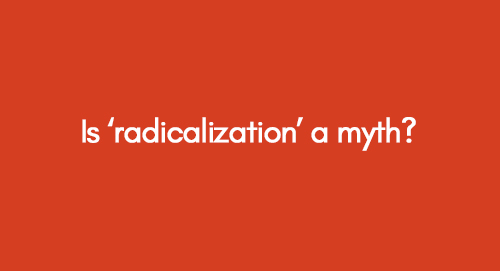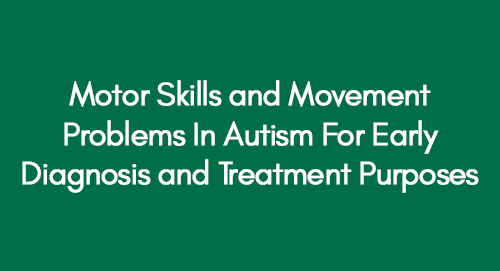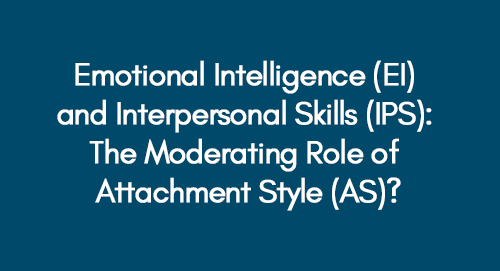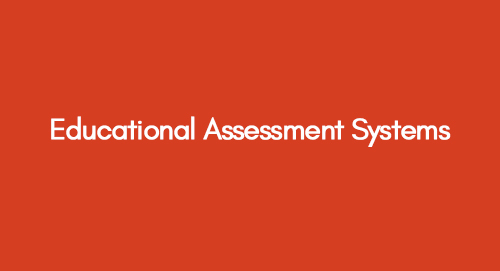
Is ‘Radicalization’ a Myth? Learn in Detail
July 6, 2022
Motor Skills and Movement Problems In Autism For Early Diagnosis and Treatment Purposes
July 6, 2022In exploring the intricate dynamics of Emotional Intelligence (EI) and Interpersonal Skills (IPS), this study unveils the nuanced influence of Attachment Style (AS), serving as a crucial moderator that intricately shapes the interplay between emotional intelligence and effective interpersonal connections.
Emotional Intelligence (EI) and Interpersonal Skills (IPS) are foundational elements in our quest to navigate the intricate web of human relationships. These competencies are pivotal in personal and professional contexts, shaping our capacity to communicate effectively, establish rapport, and cultivate meaningful connections. However, what often remains unexplored is the profound impact that our attachment style (AS) exerts on these essential skills. Attachment style is increasingly recognized as a significant moderator, moulding how emotional intelligence and interpersonal skills manifest in our lives. In this blog, we uncover the intricate interplay between EI, IPS, and attachment style.
Learn More About Emotional Intelligence
Explore More About Emotional Intelligence
Attachment style (AS), a psychological construct rooted in early experiences with caregivers, wields a profound influence on the expression and experience of emotional intelligence and interpersonal skills. This dynamic interplay reveals intriguing insights into how our attachment style can bolster or impede our ability to navigate the complex terrain of human connections. By delving into the complexities of these relationships, we gain a deeper understanding of ourselves, our interactions with others, and how we can harness this knowledge to foster healthier and more rewarding personal and professional relationships.
Introduction
Interpersonal skills are the bedrock of our daily interactions, enabling us to connect and communicate effectively with others, whether on a personal or group level. Their profound significance has been underscored by Deveci's 2019 study, which revealed that students with strong interpersonal skills tend to perform above average, highlighting their aptitude for fostering lifelong learning through effective communication. While traditionally considered straightforward behavioural rituals, a contemporary perspective redefines skilled individuals as capable of assessing their broader impact and flexibly applying various interaction techniques to achieve specific objectives, as proposed by Bigelow in 2015.
Interpersonal interaction lies at the core of marriage, family life, and social participation. A heightened level of interpersonal skills enhances one's ability to navigate fulfilling relationships, both in their personal and extended social networks. This notion raises intriguing questions about the myriad variables that might influence interpersonal skills. Interactions are intricately connected to our environment and communication, subject to a multitude of factors, both personal and external. This necessitates a comprehensive examination of the determinants that shape interpersonal skills. Drawing from attachment theory, it becomes evident that individuals form mental models throughout their lives rooted in their relationships with others. These attachment styles serve as cognitive factors that can modulate stress levels and resilience under unfavourable circumstances, often mitigating the impact of negative stressors (Khledian, 2013).
On a parallel note, Salovey and Mayer, in their work from 2016, introduce the concept of emotional intelligence—a form of social intelligence that involves perceiving others' emotions, distinguishing between them, and leveraging this awareness to guide one's behaviour and thoughts. Past experiences, personal characteristics, desires, attitudes, and aspirations all play a significant role in shaping interpersonal relationships. Above all, emotional intelligence emerges as another crucial facet to consider when examining the dynamics of human connections (Hamarta, Deniz & Saltali, 2009).
Background of the Problem
Interpersonal skills are pivotal in an individual's life, influencing their behaviour across various domains. Several researchers have diligently examined a range of variables that could potentially affect how people engage in interpersonal communication (Anwer, Moazama & Maqsood, 2017). Among these variables, the interplay between attachment style and emotional intelligence is particularly significant in shaping one's interpersonal skills.
In this current study, we delve into the intricate relationships between attachment style, emotional intelligence, and interpersonal skills. We aim to explore whether a moderating relationship exists between emotional intelligence and attachment style in their collective influence on interpersonal skills. By examining these connections, we aim to gain a deeper understanding of the complex dynamics that underlie effective interpersonal communication.
Aim and Objectives
Our study's objectives are as follows:
Examine the correlation between Emotional Intelligence (EI) and Interpersonal Skills (IPS), as well as Attachment Style (AS) and IPS.
Investigate the potential moderating impact of EI and AS on IPS.
Assess the magnitude of the influence that EI and AS exert on IPS.
Offer practical recommendations for enhancing interpersonal skills in the future based on our findings.
Research Questions
How to test the correlation between EI and IPS, AS and IPS?
How to find further if EI and AS can have a moderating effect on IPS?
How do we evaluate the extent of the effect of EI and AS on IPS?
What are the relevant recommendations that may improve IPS in the future?
Hypothesis
H0: There is an insignificant influence of Emotional Intelligence (EI) and Interpersonal Skills (IPS) on the moderating role of Attachment Style (AS).
H1: There is a significant influence of Emotional Intelligence (EI) and Interpersonal Skills (IPS) on the moderating role of Attachment Style (AS).
Conclusion
The primary aim of this research is to investigate whether attachment styles play a moderating role in the relationship between emotional intelligence and interpersonal skills. This study holds significance due to a noticeable gap in existing research on this specific topic. While numerous researchers have previously explored the link between emotional intelligence and attachment (Kamel-Abbasi et al., 2016), there is a scarcity of information about how attachment style may moderate the relationship between emotional intelligence and interpersonal skills. Consequently, conducting this research is imperative to provide a comprehensive evaluation of the interplay among emotional intelligence, attachment style, and interpersonal skills, shedding light on this understudied area and offering valuable insights for future researchers working in the same domain.
Furthermore, this research can potentially make a valuable contribution by enhancing professionals' understanding of these concepts. Psychologists, mental health professionals, and educators can utilize the findings to support better individuals' perspectives on their social skills development needs. Additionally, it can empower parents, caregivers, and educators to collaborate on interventions to bolster interpersonal skills. In essence, this study is a pivotal contribution to this field of research, offering insights that can positively impact the understanding and practical application of emotional intelligence, attachment style, and interpersonal skills.
References
Anwer, Moazama & Maqsood, (2017). The Moderating Role of Social Intelligence in Explaining Attachment Style and Emotional Intelligence among Young Adults. Pakistan Journal of Psychology. 48. 3-20.
Bigelow, J. D. (2015). Interpersonal skills. Wiley Encyclopaedia of Management, 1-4.
Deveci, T. (2019). Interpersonal communication predispositions for lifelong learning: The case of first-year students. Journal of Education and Future, (15), 77-94.
Hamarta, E., Deniz, M., & Saltali, N. (2009). Attachment Styles as a Predictor of Emotional Intelligence. Educational Sciences: Theory and Practice, 9(1), 213-229.
Kamel Abbasi, A. R., Tabatabaei, S. M., Aghamohammadiyan-Sharbaf, H., & Karshki, H. (2016). Relationship of attachment styles and emotional intelligence with marital satisfaction. Iranian Journal of Psychiatry and Behavioral Sciences, 10(3), e2778
Khledian, M., Garosi, M. R., Khairkhah, Z., & Ghalandari, S. (2013). The relationship between attachment lifestyle with depression, hopefulness and emotional intelligence. Open Journal of Social Science Research, 1(2), 15-21.
Salovey, P. M., & Mayer, J. (2016). JD (1990). Emotional intelligence. Imagination, Cognition and Personality, 9(3), 1989-1990.
Spitzberg, B. H. (2003). Methods of interpersonal skill assessment. In Handbook of communication and social interaction skills (pp. 111-152). Routledge.
Get 3+ Free Dissertation Topics within 24 hours?




























